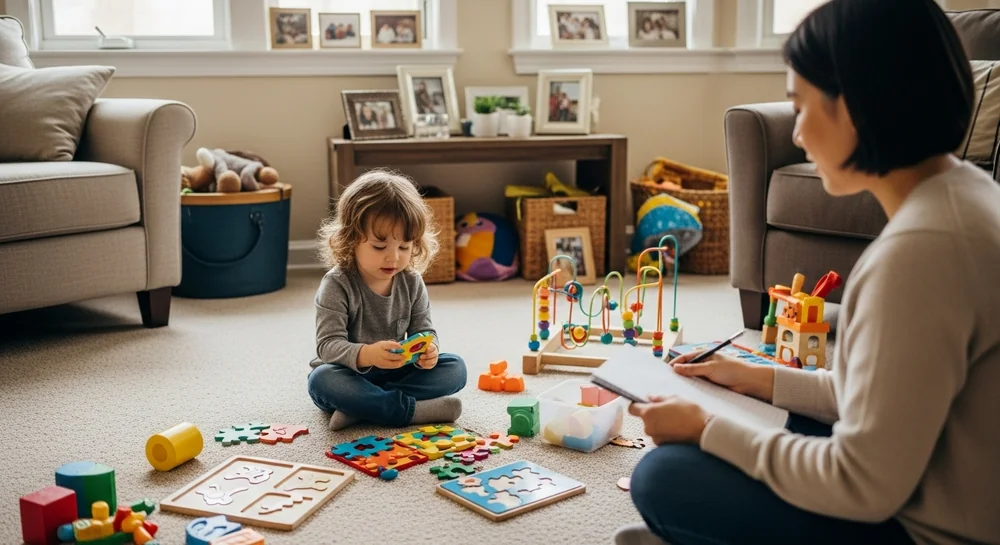Autism Diagnostic Assessments
Comprehensive, evidence-based assessments conducted by an experienced clinician and WAADF board member, bringing 20 years of clinical expertise to provide clarity and understanding for families.

About Our Autism Diagnostic Assessments
Bringing together 20 years of clinical experience, postgraduate qualifications in autism diagnosis, and my WAADF board role, I deliver comprehensive, evidence-based assessments that go beyond checklists. I am committed to staying at the forefront of research and best practice, ensuring each evaluation provides an accurate understanding of an individual's unique profile and supports informed decision-making for families and professionals alike.
Assessment Process
At Tutti Speech Pathology & Autism Services, we provide comprehensive, evidence-based autism assessments in collaboration with your child's diagnostic team. Note: The process may vary depending on the diagnostic team's requirements.
Referral & Intake
Getting started with your assessment journey
- Families complete the online referral form
- Pre-assessment forms are emailed to families
Background Information
Gathering comprehensive background information
- Parents, teachers, and carers complete Tutti Speech Autism Diagnostic Questionnaires
- Relevant reports are requested and reviewed (e.g., medical, allied health, school)
Clinical Interview
In-depth parent interview using standardized assessment tools
- Parent interview conducted using the ADI-R (Autism Diagnostic Interview – Revised)
- Completed in collaboration with the broader diagnostic team
Child Assessment & Observation
Direct assessment and observation of your child
- ADOS-2 assessment conducted at school where possible (alternative settings can be arranged)
- School observation and teacher interview completed if the child is school-aged
Additional Speech & Language Assessment
Additional evaluation when needed for comprehensive assessment
- Conducted when further evaluation of language skills is needed for accurate diagnosis
- Additional fees apply
Comprehensive Report
Detailed report preparation and team consensus
- A detailed diagnostic report is drafted and shared with the diagnostic team
- Final diagnosis is confirmed through team consensus before finalisation
Feedback Session
Results discussion and final report delivery
- Results and recommendations are discussed with the family
- Final report provided to the family, paediatrician, and psychologist/clinical team
Official Autism Diagnosis & Funding Eligibility
Getting an autism diagnosis for your child can feel overwhelming, especially when you're trying to understand what's required for NDIS supports, school funding, and Medicare rebates. This guide explains the process in Western Australia and helps you choose the best pathway for your family.
Why the Assessment Pathway Matters
In WA, an autism diagnosis can be made by:
- A single eligible practitioner (single-clinician pathway), or
- A multidisciplinary consensus team (recommended for most families)
Important: If you need NDIS funding and Department of Education school funding (Individual Disability Allocation, IDA), a consensus team assessment is strongly recommended. It ensures your child's report meets all requirements and avoids delays or repeat assessments later.
Who Can Diagnose (Under 18s)
For children and adolescents under 18, a valid consensus diagnostic team in WA includes:
One Lead Diagnostician
Required- Paediatrician (most common for children)
- Child & Adolescent Psychiatrist
- Community Child Health Specialist
- OR a psychologist with practice endorsement in:
- Clinical Psychology
- Educational & Developmental Psychology
- Neuropsychology
Plus at Least One Other Diagnostician
RequiredWith ASD assessment expertise
- Speech Pathologist (most common, especially for language and communication profiling)
- Psychologist (general registration) (often used when the lead is a paediatrician)
Note: Occupational Therapists can contribute assessment findings but cannot be listed as a diagnosing member for school funding eligibility.
What the Diagnostic Report Must Include
To meet NDIS and Department of Education (IDA) requirements, the final diagnostic report must clearly state:
• Level 1 (requiring support)
• Level 2 (substantial support)
• Level 3 (very substantial support)
Funding Pathways Explained
- Autism is a List A primary disability, meaning eligibility is straightforward when reports meet requirements.
- A Level 2 or Level 3 diagnosis almost always qualifies.
- Level 1 diagnoses can still be eligible but may require additional evidence about day-to-day impacts.
- Paediatrician sign-off is not needed unless your report specifically requests it.
Schools can apply for Individual Disability Allocation (IDA) funding to support students with autism. Eligibility requires:
- A report from two qualified diagnosticians who confer and agree on the diagnosis (consensus pathway)
- Reports must meet DSM-5 and Australian National Guideline standards
- If a single-clinician pathway is used, a second eligible practitioner must provide written verification agreeing with the diagnosis and severity level
If your child is:
- Under 6 → You may not need a formal diagnosis to access NDIS supports for developmental delay
- Under 9 → Children with a diagnosis can still access supports under the ECA pathway
In WA, the Early Childhood Approach is delivered by Wanslea:
Phone: 1300 969 645
Email: ndis@wanslea.org.au
Families can access rebates for diagnostic assessments for children aged 0–25 under MBS Item 82000. You'll need:
- A GP referral to a paediatrician or psychiatrist
- A referral from them to allied health professionals for the assessment
Note: Paediatrician wait times can be long. Some families choose to proceed privately without Medicare rebates to avoid delays.
Some private health insurers cover parts of the diagnostic process, such as sessions with:
- Speech Pathologists
- Psychologists
Check your policy to see what's included.
Key Takeaways
Useful Websites for Families
Ready to Begin the Assessment Process?
Contact me to discuss your concerns and learn more about our autism diagnostic assessment process.
